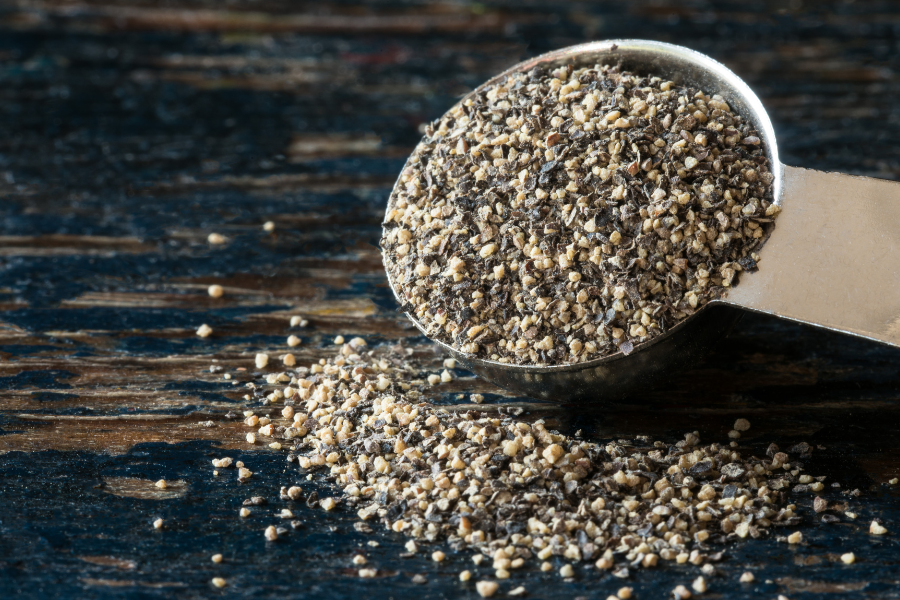Dog lovers usually want their pups to enjoy the best when it comes to their food. Yet most dog food options on the market leave much to the imagination. And if your dog requires a special diet, good luck helping them find something they actually enjoy eating!
(And for those table scraps eaters, well, they’ll take whatever they can get!)
So, it’s common for many owners to wonder if their pups can eat food with black pepper in or on it. After all, black pepper brings taste to everything, and if dogs are struggling to get into eating their usual food, owners may be tempted to sprinkle a bit on top to entice them.
But are spices safe for dogs? And if not, what are the alternatives to black pepper that you can use to help bring more life to your pup’s meal? Read on to learn if black pepper is safe for dogs and how to help them enjoy a happy, healthy diet.
Unpacking Black Pepper: What Is It, Really?
Ever heard of the "king of spices"? The king is, indeed black pepper! Black pepper as you buy it in the store is prepared from the dried berries of the Piper nigrum plant and sets our taste buds on a free-for-all trip with its enticing smell and spicy taste.
But here is the cool fact - it's because of something called piperine that gives black pepper all of its sass, a compound that also blesses us humans with some health benefits. But does this kick it off with our dogs, too? Let's sniff around and see just how this spicy sensation can affect our cuddly canines.
Should You Spice Your Dog’s Food?
As humans, we love spices. Black pepper, in particular, can bring out the flavor profiles of many different types of food, and the aromatic properties can give any meal a bit of an extra punch.
But while we may have the ability to digest and metabolize various ingredients, dogs may not have the same luck. It may surprise you to learn that dogs have similar taste buds as us – but far fewer taste receptors (1,700 to our 9,000).
Why does this matter? When a dog’s taste is less powerful than their smell, the smallest spice may not impact the food but has a huge effect on the experience. Dogs may find black pepper intriguing by smell – but it may not offer much when they take a taste.
Now, this doesn’t mean that a dog won’t happily take the meat or vegetables that you offer with black pepper included. But excessive amounts can lead to digestive problems, which is why keeping a close eye on how much they consume is key.
What Happens If A Dog Consumes Black Pepper?
If your dog happens to consume black pepper, don’t fear. In small amounts, black pepper and black pepper extract has been shown to be relatively safe for healthy dogs. When consumed in excessive amounts, however, some dogs have shown symptoms similar to other digestive problems, including:
- Nausea
- Vomiting
- Lethargy
- Diarrhea
Are There Any Health Benefits to Black Pepper?
You may be surprised to learn that black pepper is packed with a variety of vitamins and minerals that can be healthy – such as Vitamin K, iron, and manganese.
However, the amount that would need to be consumed in order to see any benefits is outweighed by the potential adverse side effects. Like any other dietary change, the focus should be on avoiding any concerning health impacts than attempting to eke out a minor health benefit from micronutrients.
What Alternatives Are There To Black Pepper?
Always check the labels of your dog food to see what types of spices are being used in the ingredients. While black pepper may not be there, manufacturers often try to add a bit to help entice dogs to eat.
If you really want to add some spice to your dog’s meals, you can try out a variety of dog-safe alternatives that will offer a kick while protecting their bellies. Parsley, basil, turmeric and rosemary can offer both flavor and health benefits—and some have been shown to aid digestion and freshen breath!
Tips for a Healthy Dog Diet – With or Without The Pepper
Outside of what your dog should or shouldn’t eat, how can you be sure that Fido is getting all the nutrients it needs? While black pepper may not play a role in a healthy overall diet, there are steps you can take to make sure your pup is growing and thriving – and it all starts in the bowl.
A Balanced Diet
For dogs, you shouldn’t just trust any food label on a dog food bag. Most breeds require a diet that balances high-quality protein, healthy fats, and plenty of carbohydrates to power them through the day. You’ll also want to make sure that your dog gets the right vitamins and minerals, such as Vitamin A, E, D, and K – essential for strong bones and a healthy immune system.
Watching Your Dog’s Reaction To Food
If you’re ever concerned about how your dog may respond to particular foods or spices, it’s best to keep a close eye on them when introducing any new food. If you notice anything unusual – such as a change in appetite, energy levels, or unexpected bathroom habit disruptions, reach out to your vet and halt the changes.
Speak To Your Vet If Concerned
Your vet is a great resource for any concerns or questions you have when it comes to your pup. Don’t be afraid to ask questions about particular foods – even down to the spice – to see what they would recommend you feed them.
They may have specific guidelines depending on the breed and will be more than happy to offer advice on what foods or ingredients to avoid. And if you happen to fear any adverse reactions, they’re your first source for help.
Conclusion of Black Pepper – Not Toxic, But Not Recommended for Dogs
Unfortunately, doggy chefs should try and avoid using black pepper in their dog’s food, even if it’s to help encourage them to eat. Instead, owners should look to incorporate more dog-friendly herbs or spices into their diet if they want to go beyond the basic dog food brands.
By taking the steps to research the options available and finding the right mix of food for your dog, you can help provide them with a happy and healthy diet. Your dog’s happiness and health are in your hands – so always take the steps you can to keep them safe.
If and when you have any concerns or questions, don’t hesitate to reach out to your vet!
References
1) European Food Safety Authority. (2022). Safety and efficacy of feed additives prepared from Piper nigrum L.: black pepper oil and black pepper oleoresin for use in all animal species and a supercritical extract for use in dogs and cats (FEFANA asbl). EFSA Journal, 20(11), Article e07599. https://doi.org/10.2903/j.efsa.2022.7599



